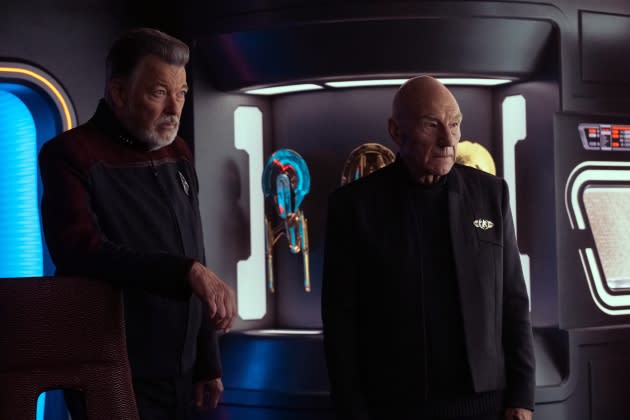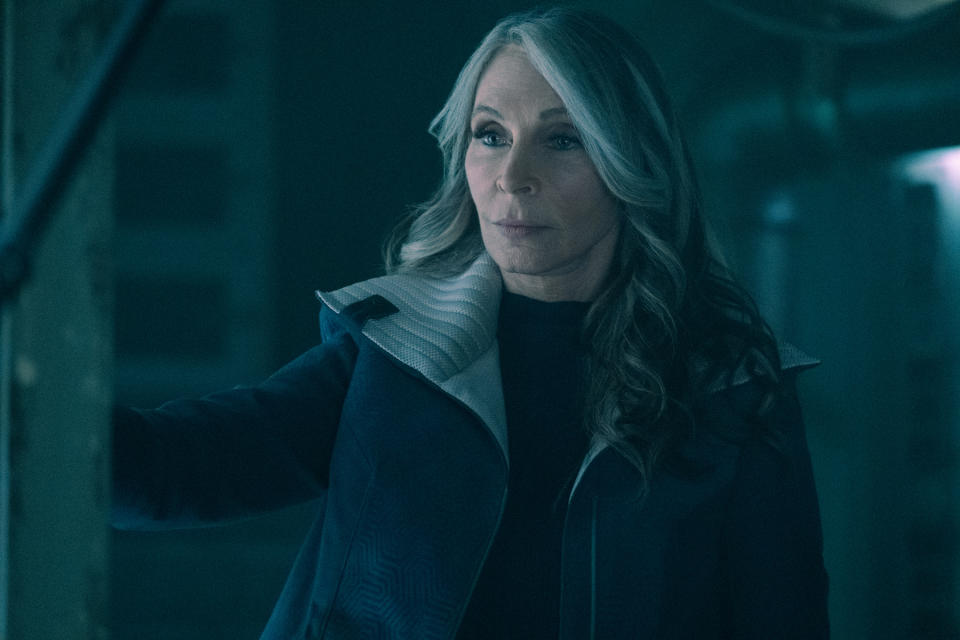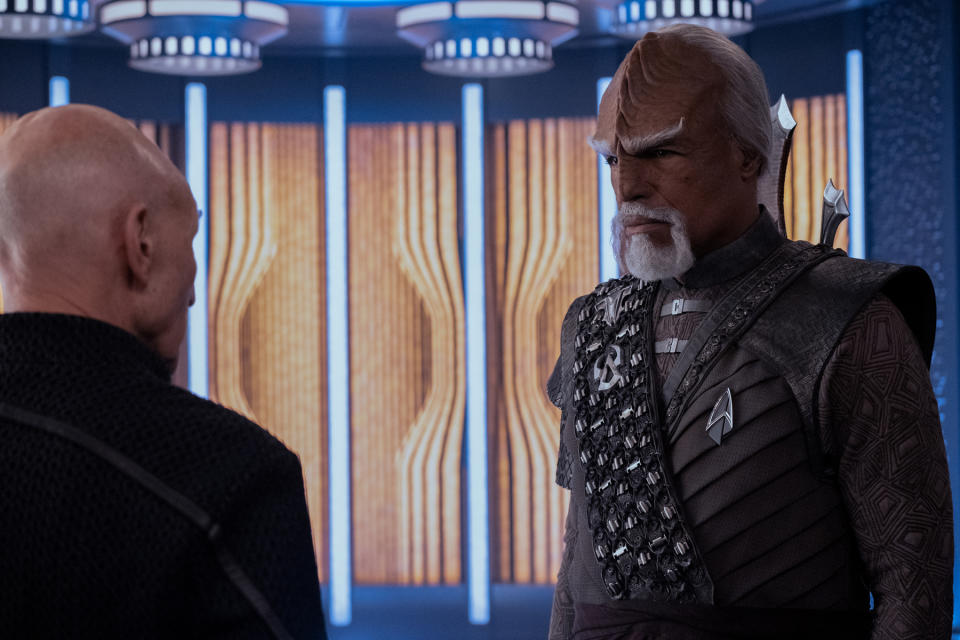‘Star Trek: Picard’ Season 3 Finds Its Magic by Reuniting the ‘Next Generation’ Crew
- Oops!Something went wrong.Please try again later.
- Oops!Something went wrong.Please try again later.
- Oops!Something went wrong.Please try again later.
- Oops!Something went wrong.Please try again later.
- Oops!Something went wrong.Please try again later.

Early in the new season of Star Trek: Picard, our eponymous hero (played, as always, by Patrick Stewart) and his companion Laris (Orla Brady) are supervising the donation of many of his career mementos to various Starfleet and Federation museums. Jean-Luc fears being an old relic who just waxes on about the good old days, but she assures him that he doesn’t have to spend so much time talking about the present. “The past matters, and that’s okay,” she insists. “A point comes in a man’s life when he looks to his past to define himself.”
It is hard to imagine a more blatant mission statement for a season of television than this exchange. The first two Picard seasons were largely forgettable save for the spectacle of Stewart continuing to give the material his all even as he entered his 80s. Attempts to give him a new crew never really clicked, and the lengthy story arcs were a slog. Among the rare highlights was a Season One episode where Jean-Luc paid a visit to old shipmates Will Riker (Jonathan Frakes) and Deanna Troi (Marina Sirtis), whose relationships with the title character felt much more lived-in than attempts to generate new backstory between him and, say, former Starfleet intelligence officer Raffi Musiker (Michelle Hurd).
More from Rolling Stone
Netflix's 'My Dad the Bounty Hunter' Is an Afrofuturist Marvel
Annie Wersching, Actress in '24,' Marvel's 'Runaways' Dead at 45
So for the show’s third and final season, the Picard creative team has largely abandoned all pretense of trying to boldly go where Jean-Luc has never gone before. Will and Deanna are back, and so is virtually all of the Star Trek: The Next Generation ensemble at one point or another, including former ship’s doctor — and Picard’s old flame — Beverly Crusher (Gates McFadden), noble Klingon warrior Worf (Michael Dorn), and level-headed engineer Geordi La Forge (LeVar Burton). The season even finds a way to get Brent Spiner back, even though — as Jean-Luc points out in one episode — we’ve already seen Data die twice. (Once in Star Trek: Nemesis, once at the end of Picard Season One.)

Raffi is still hanging around, as is Jeri Ryan as Star Trek: Voyager alum Seven of Nine, but the rest of the Picard ensemble is gone. Dr. Crusher is being hunted by parties unknown, for reasons unknown, and her desperate situation results in most of the Enterprise-D bridge crew teaming up to help her.
Now, much of the new season is pretty shameless pandering. It’s not just that the old gang is back, but that these episodes quote liberally from famous compositions from past Star Trek films, as well as certain story beats. There are several episodes, for instance, where Picard, Riker, and Seven are on a starship being chased through a nebula by a relentless foe, one of several ideas borrowed from Star Trek II: The Wrath of Khan. There are Easter eggs galore, Worf inevitably references the notion of it being a good day to die, other old faces and ships appear, and on and on. At one point, Jean-Luc simply begins recapping the plot of a famous Next Generation episode (“Darmok,” the one where he met an alien race who communicates entirely in metaphors) for a group of eager Starfleet cadets. Large swaths of the season can feel like fan service in search of a story to justify it all.
At the same time, the fans (myself included) could use a little service and pandering after two disappointing seasons that did not live up to the magic of the franchise’s greatest actor reprising his most famous role. Star Trek as a whole may be on a bit of an upswing thanks to shows like Lower Decks and, especially, the defiantly old-school Strange New Worlds, but a lot of the CBS All Access/Paramount+ era has been very frustrating. If a show’s not going to be great, it may as well just give the people all the characters and callbacks that they want.
The new episodes do not qualify as great. There’s a deadly-dull mystery thread involving Raffi and Worf. She still feels extraneous despite Hurd’s best efforts, while Michael Dorn gets buried under a metric ton of exposition that doesn’t play to any of his strengths as an actor. Some of the storytelling can still be clumsy: the Wrath of Khan homage doesn’t really work because we don’t know or understand the villain (played by Amanda Plummer) the way we did Khan. And the show still offers only the most superficial attempts at being more “adult” than Next Generation. When Star Wars finally wants to be adult, it gives us Andor, a morally complex, Wire-esque drama touching on multiple layers of society within the Empire. When Star Trek tries to be more adult, Patrick Stewart gets to call someone a “dipshit from Chicago.”

Having said that, these new episodes are still a vast, vast improvement over what Picard has done before. The TNG cast has remained close over the decades, and their chemistry from the Eighties and Nineties still works. Dorn may struggle rattling off the criminal histories of characters we’ve never heard of before, but he also gets to beautifully deliver one-liners like, “Beheadings are on Wednesdays,” and still has that fire in his eyes when Worf is preparing to risk his life on behalf of his friends. Jonathan Frakes (who also directs several episodes) does some strong work as a sadder, more cautious William Riker. And because these characters have so much shared history, many of them can stand up to their former captain and generate interesting drama, where most of the Picard newbies treated him on some level with reverence. The new season’s fifth episode, which brings back a recurring player from Nineties Trek, is especially satisfying in how it forces Jean-Luc to revisit decisions we saw him and others make way back when. As outstanding as Stewart was at playing this older, frailer Picard in the first two seasons, he seems even stronger getting to spar with so many of his old scene partners.
Strange New Worlds has made a convincing argument that Trek is best served by going back to the Mission of the Week format that served Picard so well in middle-age. The conspiracy plots here aren’t inherently more interesting than what we got in this show’s first two seasons, but they seem more exciting by virtue of who’s involved. It would have been fun for the show to contrive an excuse for this elderly crew to reunite for one final burst of exploration, and simply visit a new planet every episode. Failing that, though, this class reunion is pretty darned entertaining. As Don Draper once said — while talking about an object that he insisted was not a spaceship — nostalgia literally means “the pain from an old wound,” and suggested that there was nothing wrong with revisiting “a place where we ache to go again.” It’s good to be back in this particular company of Starfleet officers after all this time.
The third season of Star Trek: Picard begins streaming February 16 on Paramount+, with additional episodes releasing weekly. I’ve seen the season’s first six episodes.
Best of Rolling Stone

